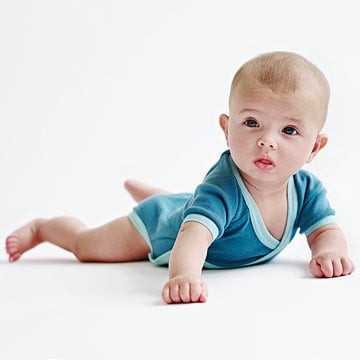
Table of Contents
18-Week-Old Baby – Understanding Diastasis Recti, dealing with a super active, hurt-prone baby, and celebrating the munchkin’s heightened visual development. Let’s set right into month 4.5!
Your baby's eighteenth week after birth
By 18 weeks, most babies are reaching more developmental milestones and have a good idea about how to handle themselves. By now, your little one must’ve discovered their feet and toes and have started rolling over (if they haven’t already).
Babies continue to gain weight although it will reduce a bit compared to the previous months. Their emotional and mental development will be rapidly increasing. Your little one goes through lots of changes in their physical behavior and motor coordination portions. As your baby has started rolling over (or is on the verge of doing it), they love the concept of movement and want to engage themselves in it. So, if you hold or wrap your baby, they’ll constantly wriggle and might bump their head on the floor or fall off the couch. Also, take extra precautions to prevent the worst from happening, if your baby has started rolling over.
Your 18-week-old baby's development and physical growth
Your baby’s weight:
- On average, your 18-week old baby should weigh around 16 lbs 9 oz (7.5 kg), if you have a baby boy. If you have a baby girl, she should weigh 15 lbs 3 oz (6.9 kg).
- They will gain weight but it’s a little less compared to the previous weeks.
Your baby’s sleep:
- At this age, babies sleep 10 to 12 hours during the night and need to nap for 3 to 5 hours a day.
- Seep is still the most important aspect of your baby’s growth.
- If there are any distractions, it might disrupt your baby’s sleep and will make them cranky.
- You can use some techniques or activities to make your little one fall asleep quickly. You can sing to them, hold them for a while, cuddle with them, or take a small stroll in the pram, and so on.
- At this age, you don’t need to wrap your baby up when they sleep.
Your baby’s diet:
- If you’re breastfeeding your baby, you should get 24 to 36 ounces of breastmilk a day and spread it out over about 5 or 6 feeds.
- Whereas, formula-fed babies need 24 to 36 ounces of formula given in 5 feeds.
- Furthermore, it’s time for working mothers to return to work or take some time to catch up with work-related activities.
- If all this while, your baby was purely feeding off your breast, it might be necessary to start feeding them via a bottle.
- Since bottles provide babies with increased flow and convenience, they accept the bottle quickly.
- However, some babies may not accept the bottle as readily.
- Hence why it’s important to introduce the bottle to your baby gradually.
- As you introduce it slowly and repeatedly, your little one will start drinking from the bottle.
- Additionally, pump the breast milk and store it in your fridge. So that, you can give it via bottle for later. If you are unable to, resort to giving the formula.
Your newborn and 18-week-old baby's reflexes
- Nowadays, your little one finds everything interesting and intriguing, even their body parts. You’ll notice your baby observing their hands and legs, how they move, and attempt to put them in their mouth. Soon, your baby will be able to put their legs on the bars of the crib and push themselves to move around. Hence why you shouldn’t be surprised to find your baby in weird positions.
- Most parents recommend not to wrap your baby up. Your little ones will be able to move their limbs a lot more than before, so leave them as they are.
- Their teeth are about to grow. They’ll take their positions under the gums and erupt slowly. Moreover, if your baby has early teething tendencies, there’s a high chance that the front teeth of the bottom gum are already starting to show themselves.
- By now, your baby is learning about their individuality. They understand that their sounds are different from yours.
- Gradually, your baby will start interacting and trusting the familiar faces around them. So, your little one will be a little wary around strangers. Your baby will most probably cry and look around for you among strange faces.
- Furthermore, your little one’s perception of space, depth, and coordination has also improved a lot. At this age, babies can go for objects and grab them. They’ll be able to look at multiple objects and follow those with their eyes easily.
- Your little one’s communication skills will develop a lot. You might notice your baby trying to imitate the sounds you make and establish contact with you. When you repeat back the sounds that your little one is making in a loud voice or a different tone, it will act as validation. It encourages them to communicate more.
Your newborn and 1-week-old baby's health
Teething Pain:
- To ease your little one’s teething pain, give them something to chew on.
- You can go for some teething toys or rings.
- You can even use something cold like a partially-frozen wet washcloth.
- Sometimes frozen teething items are too hard for your little one’s sensitive mouths.
- However, do not use benzocaine-based teething gels or anything labeled as homeopathic to numb their pain.
Allergies:
- Although it’s rare, there is a possibility that your little one will develop allergies.
- They can develop allergies to irritants such as pollen, mold, pet dander, and dust mites.
- In babies, allergy symptoms resemble those of cold symptoms.
- So, be on the lookout for runny noses, sneezing, coughing, watery eyes, and congestion.
Hand, foot, and mouth disease (HFMD):
- For babies and children under the age of 5, HFMD is extremely common.
- It is a fairly mild infection.
- You’ll tend to notice some painful, bumpy, red rash or blisters on the hands, soles of the feet, and inside the mouth of your baby.
- Consult your general practitioner for a solution.
Tests and Vaccinations:
- You must’ve already administered the vaccines for PCV, diphtheria, Pertussis, Tetanus, Polio, Hepatitis B, and Rotavirus, etc weeks ago.
- In the 18th week of your child’s age, there are no specific vaccines to be administered as long as you’ve got all the previous vaccines fully completed.
- If you haven’t, consult your doctor to schedule them for you.
Postpartum baby tips: Week 18 after birth
Understanding your baby’s curiosity
- If you must’ve figured out that, babies are very curious.
- Your curious little ones will be curious about themselves.
- They tend to start noticing different things about themselves.
- However, it is strange if your baby doesn’t seem interested or doesn’t seem to register their presence, new toys, and games at all.
- Consult your general practitioner as soon as possible.
- If your little one is not interested in interacting with others and often seems lethargic, there could be some health-related issues.
- Take them to a pediatrician immediately!
Understanding your baby’s mental and emotional developments
- By now, your baby is growing rapidly, their mental and emotional development is developing as well.
- This will give your little one a personality in the future.
- These developmental milestones can bring in a sense of relief and you should feel proud of your baby.
- However, consult a doctor and get your baby checked if they are not developing as per their age!
The mother's body after childbirth: What is happening in your body in the eighteenth week after giving birth?
Your body dealing with diastasis recti
- Most women might not have heard about diastasis recti, a common postpartum condition until they have it.
- Thanks to your growing uterus and hormonal changes, during pregnancy your abs start to stretch and separate.
- You might not even notice it but after even delivery, the muscles remain separated by an abnormal distance.
- Some common signs of diastasis recti are your belly poking out months post-delivery, lower back pain, constipation, or urinary incontinence.
- When you lay flat on your back, contract your stomach muscles and gently press your fingers into the area around your belly button, you might be able to feel the gap in your abs.
- For diagnoses, consult your doctor. Your doctor will refer you to a physical therapist who specializes in postpartum health.
- They will safely rebuild your abdominal wall with the right exercises.
- In some extreme cases, you might need surgery.
You want a good sitter
- If you are a working mother or just want a night out with your friends, you need someone to look after your little one.
- If you’re lucky enough to have doting grandparents who happen to live nearby, god for you!
- However, if you don’t have one yet ask other moms for some recommendations.
- Ask caregivers at a local daycare center or gym nursery, as they might know people who will.
- Before your first night out, remember to meet your prospective sitter or nanny.
- Do a mini-interview, ask them about their training in infant care and CPR, how they’d handle emergencies and their charges.
- Let them hold or play with your little one, too.
- Always check the references and run a background screening, if possible.
Final Thoughts
You must’ve witnessed quite a few developments in your 18-week old baby. Although it may seem like that your little one has turned 18 weeks so soon, you know that it’s not true! All those sleepless nights, feedings, and constant diapering. Phew! You’ve done everything possible to take care of your little ones and helped them meet their milestones. Good job parents! Also, remember don’t be so hard on yourself. You are learning as you go and as of now, you’re doing a pretty good job!
FAQs- Your 18-Week-Old Baby: Development & Growth
1. How far can an 18-week old baby see?
2. What can a baby do at 18 weeks?
3. Do babies have a growth spurt at 18 weeks?
Reviewed By-

Nimrat, Pediatrics
Dr. Nimrat S Sidhu is a practicing pediatrician for about 5 years now and holds an MD pediatrics degree. She was the topper of her batch, has always had a keen interest in her core medical field, and is specially trained for neonatal resuscitation.










